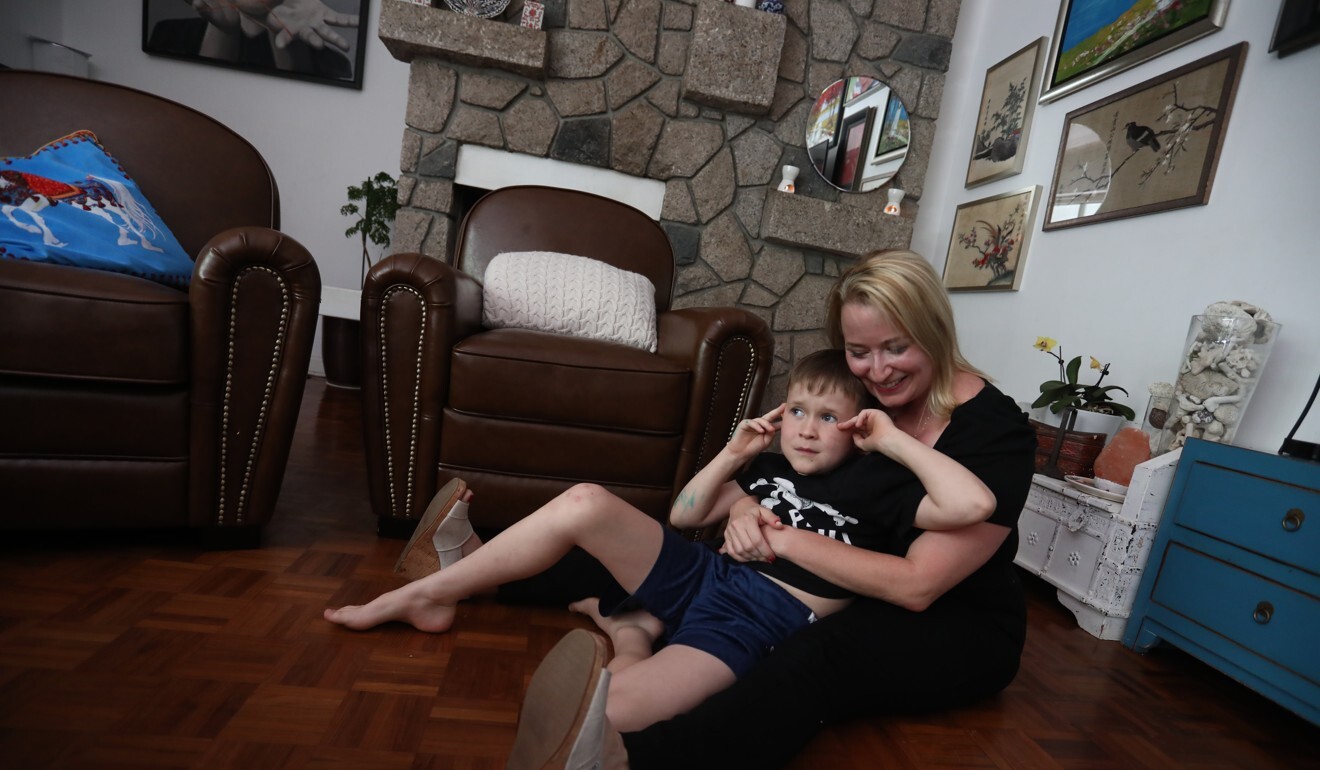
Hong Kong mum’s anger turns into mission to end prejudice, after autistic son is barred from using disabled toilet
- New charity hands out stickers with message urging compassion towards those with special needs
- Parents of special needs children say people often stare, yell at them when kids act up in public
Mary Schaus remembers how angry she was the day an attendant refused to unlock a toilet for the disabled, and her eight-year-old autistic son wet himself.
But that incident not only sparked her desire to raise awareness about people with special needs, but also inspired a new charity, the Talos Foundation, named after her son, Alexander Talos Schaus.
It hands out lanyards and stickers with a message in Chinese and English, saying: “Special Needs: Kindness and Compassion.”
Schaus, 45, an American who has lived in Hong Kong for 17 years and works in human resources for a law firm, recalled the incident in February that started it all.

She and her businessman husband David, also 45, had taken Alexander for a special needs class at a municipal centre in Central when he needed to use the toilet.
She took him to the disabled toilet, only to find it locked. When she asked the attendant to open it, he refused, saying it was only for disabled people and disregarded her son’s disabled card.
As they argued, Alexander wet himself.
“I was very angry. It was just wrong,” said Schaus, who also has an older son, Kane, 12, born in Hong Kong as well.
Calming down took a while, before she realised one day that she had a choice.
“You can make the best of a situation, or you can be really angry and bitter. I decided to make the best of a situation,” she said.
Little things like this can help. This will hopefully help people understand that everyone is different
She remembered how she found a way to help her father, who has Alzheimer’s and sometimes acts out in public. She made business cards for her mother to hand out, and a button that said: “My name is Jim. I have Alzheimer’s. Thank you for your patience.”
Schaus spent a month and put her money into working with a designer to create 100 lanyards and stickers, with the symbol of a head with a heart inside and the message appealing for kindness and compassion towards those with special needs.
She tested her creation in May, while on a family staycation at a hotel in Sha Tin. On one occasion, a hotel employee who spotted the sticker took Schaus and Alexander to a separate entrance to help them use the toilet.
“I said, ‘wow’, that worked,” Schaus said.
She then posted the design on Hong Kong Moms, a private Facebook group with 64,900 members, and was shocked when hundreds of people as well as companies responded, offering to help distribute the lanyards and stickers.

Schaus decided to set up the charity, and is in the process of getting the paperwork done. Since last month, about 2,000 lanyards and stickers have been sent to about 20 distribution points, such as physiotherapy offices, bookstores and playgroups, for people to pick up free of charge.
Over the past few weeks, more companies have contacted her to say they are keen to help run events to educate and raise awareness among the public.
Hong Kong has more than 57,000 students with special educational needs (SEN) spanning learning difficulties, attention deficit hyperactivity disorder (ADHD), autism spectrum disorders, speech and language impairment, intellectual disability, hearing impairment, physical disability, visual impairment and mental illness.
Schaus said Alexander was diagnosed with autism and intellectual disabilities in 2016, when he was three.
Scanning back of eye can reveal autism risk, Hong Kong researchers say
She said strangers had stared or yelled at her many times because they misunderstood the boy’s behaviour. Other parents of special needs children say the same thing too.
“They get yelled at. They get criticised. The children get bullied for exhibiting behaviours that people do not think are OK or normal,” Schaus said.
Wendy Huang Wen-jie, community organiser with the Society for Community Organisation, an NGO that helps the underprivileged, said she believed Schaus’ product was a good idea.
Huang said although there was more awareness of special needs children in Hong Kong today, some people were still confused by their behaviour and found it hard to accept.
When children such as those with ADHD acted differently in public, for example, people tended to assume the parents had not taught the children to behave, Huang added.
Schaus hopes her lanyards and stickers can go a small way towards raising awareness and addressing the prejudice towards families such as hers.
“Little things like this can help. This will hopefully help people understand that everyone is different,” she said.

